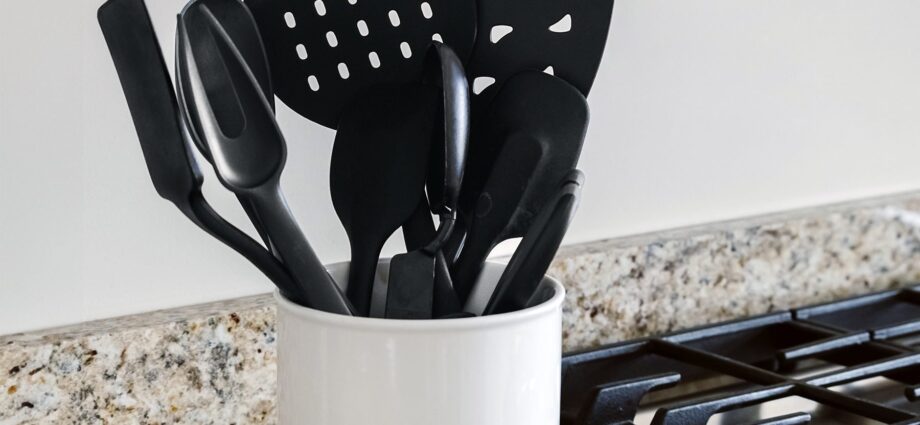
Grace Cary/Getty Images

Grace Cary/Getty Images
Research links black plastic cooking utensils to toxic flame retardants that could be harmful to your health.
Now Trending
Walk into almost any kitchen and you’ll find a utensil holder next to the stove. It houses essential, everyday cooking tools, like slotted spoons and spatulas. If those utensils are made of black plastic, they might contain hazardous substances.
CNN reports that new research published in the journal Chemosphere found black-colored plastics used in children’s toys, cooking utensils and takeout containers include “alarming levels” of flame retardant substances, which are toxic and linked to increased cancer risk in humans.
Is black plastic dangerous in the kitchen?
Simply put, yes, black plastic cooking utensils are dangerous.
Manufacturers add brominated flame retardants to many home electronics like TVs and computers to reduce the risk of overheated devices exploding or catching fire. Many of these substances have proven to be highly toxic and have been officially phased out. Unfortunately, devices containing the banned flame retardants can linger in our homes for years, and when they get recycled, the toxic plastic can be mixed with food-grade plastic to create things like takeout trays, cooking utensils and children’s toys.
Because black plastic is sourced from electronic scrap, it’s the most likely to contain toxic flame retardants.
“There have been previous studies done in other countries where they’ve seen the same issue of black plastic being contaminated with flame retardants, as well as studies which show flame retardants can leach from kitchen utensils into food and into children’s saliva through the mouthing of toys,” lead study author Megan Liu told CNN.
“We need government and corporate policies that restrict the use of these harmful chemicals like flame retardants and hazardous plastics so that we can safely recycle items without worrying about chemical contamination and our health,” she said.
What are the safest kitchen utensils?
You can easily avoid black plastic utensils by choosing from many other materials for kitchen tools.
Wooden utensils, including spoons and turners, have many benefits. They’re nonabrasive and won’t damage your nonstick cookware. Wooden utensils also won’t conduct heat when you’re tending to food on the stove.
Unibody silicone utensils, aka single-piece tools without seams or holes, are another great alternative to black plastic since they share plastic’s lightness and flexibility. These tools come in a range of colors and, depending on the model, have impressive heat resistance.
If you’re not working with nonstick or enameled surfaces, stainless steel utensils can also be a great alternative to black plastic. They’re easy to clean and can be very thin and rigid, allowing you to complete precise cooking tasks like flipping delicate fish.
It’s harder to avoid black plastic takeout containers. Just reduce your risk by microwaving the food in a separate vessel, such as a ceramic bowl or plate. This will prevent more chemicals from leaching into the food as it’s heated.

